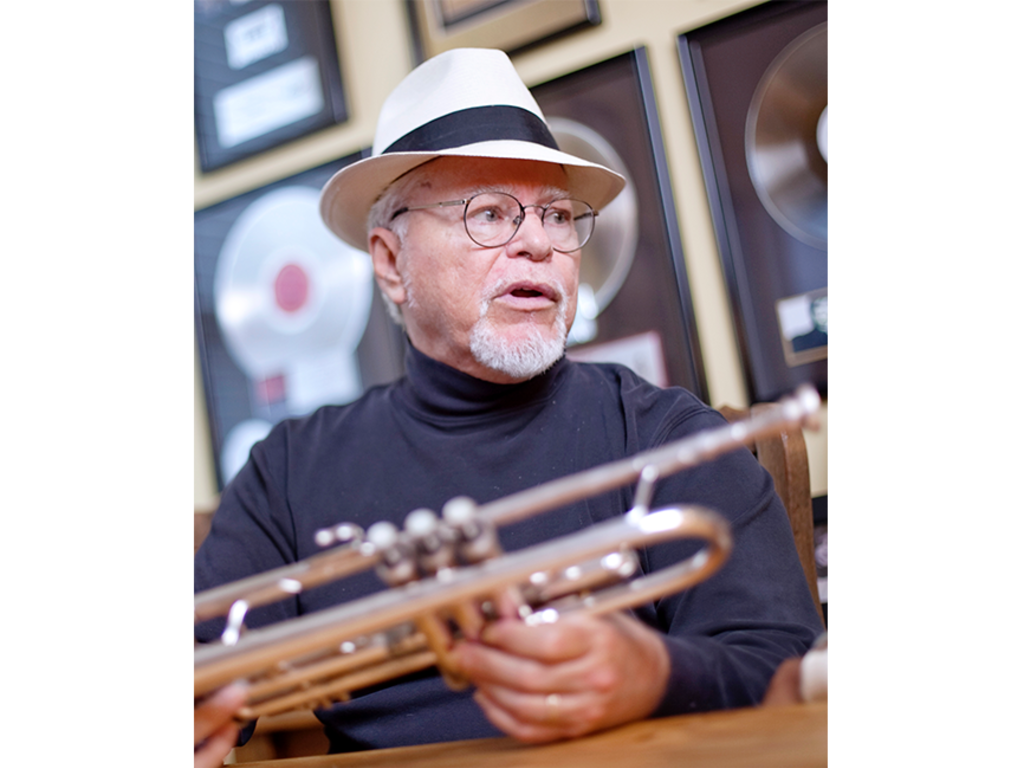Watching the archived footage, it takes a minute to realize that a platinum record hangs on the wall behind Wayne Jackson, who is sitting for an oral history interview with Rhodes student Zach Harpole ’12. The world-renowned trumpet player began his career at Stax in Memphis as a teenager and gained international fame (with Andrew Love) as one of the Memphis Horns. The interview took place in Jackson’s Memphis home in front of the late musician’s personal wall of fame.
Harpole and Jackson have been discussing recording hits in the studio and touring with Otis Redding and Sam and Dave in the 1960s. As the video rolls, Harpole asks, “On most Stax records, you played in the horn section?”
“Yeah,” says Jackson, his gravelly voice proud. “I’m on almost every record they ever made.”
That’s a lot of records. Stax, founded in Memphis in 1957 and a pivotal music house for the Memphis sound, released more than 800 singles and nearly 300 LPs from the late 1950s through the 1960s. The Jackson interview, recorded in 2011, is just one of 15 oral histories of musicians and others from Stax Records that Rhodes students have recorded, trying to capture an epic moment in music history and help cement Memphis’ role in that story.
“By using these sources to explore how young people added to the richness and complexity of the Memphis music story, our students are able to see how their own research and creative activity can make a difference,” says Dr. John Bass, director of the Mike Curb Institute for Music.
Like many of the other projects being digitized by Rhodes students, the Stax oral histories offer a compelling narrative of a critical point in Memphis’ past. Jackson and the other Stax musicians made music during an era when racial strife abounded in Memphis. Within the recording studios of Stax and on tour around the world, however, the story was different.
Harpole: “So (Stax house guitarist) Steve Cropper has said that race was left at the door when you walked into Stax and that people didn’t see black or white inside the studio. Do you agree with that?”
Jackson: “Yes. Pretty much. My [musical] partner’s a black guy and we played those horns together. We never had an idea; he had never had an idea that I was a white guy from Arkansas, I don’t think. We just had too much fun.”
Rhodes is also working to digitize oral histories collected by Stax. “The stories had been collected over the years, but Stax had no way of managing them,” says Patrick Smith ’18, who has combined his interest in music with new skills in digital archiving, such as standardizing formats and transcribing and coding the interviews to make them searchable.
Smith says the Stax collection is nearly fully digitized and will soon be available online for public access. Researchers or just the musically curious will be able to learn much about the studio, about the individuals being interviewed, and about the world that existed and was impacted by Stax’s presence. Some of the newer interviews are available now on the Crossroads to Freedom YouTube site. Crossroads to Freedom, the original digital archive project begun more than 10 years ago at Rhodes, is rich with these and other digital histories of the Memphis region.
— By Leanne Kleinmann
